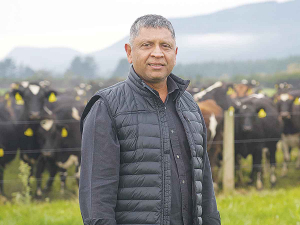Indian FTA 'opens doors for dairy'
A New Zealand dairy industry leader believes the free trade deal announced with India delivers wins for the sector.
 Prem Maan, Southern Pastures’ executive chairman says their farms have a massive programme to sequester carbon and reduce greenhouse gas emissions.
Prem Maan, Southern Pastures’ executive chairman says their farms have a massive programme to sequester carbon and reduce greenhouse gas emissions.
Corporate dairy farmer Southern Pastures has been judged to be a responsible investment leader for the seventh year running.
The company, which owns 19 dairy farms in Waikato and Canterbury and is the owner of premium dairy brand Lewis Road Creamery and wholesale business NZ Grass Fed Products LP, says it remains the only organisation from New Zealand's agriculture and food sectors to ever be included in the annual benchmark report released by the Responsible Investment Association Australasia (RIAA).
"So often the pastoral industry is judged by outputs such as emissions, but we're not nearly as rigorously measured or assessed for the positive services that some of us provide," says Prem Maan, Southern Pastures' executive chairman.
"On our farms, we have a massive programme of work underway to sequester carbon and reduce our greenhouse gas emissions and foster biodiversity through, for example, good soil management, native plantings, and animal feed.
"We also act at executive level as strong stewards for more sustainable and resilient assets and markets. The RIAA benchmark is one way these positive efforts are independently recognised," says Maan.
RIAA represents investors with assets under management of over US$29 trillion, including NZ Managers who represent $328 billion.
Southern Pastures produces milk under its independently-audited 10 Star Certified Values standard, which covers stringent grass-fed, free-range, climate-change mitigation, human welfare, animal welfare, and sustainability requirements.
It doesn't feed cows imported palm kernel expeller (PKE), claiming its production contributes to loss of rainforest and biodiversity.
It also refuses to trade in carbon credits or offsets to achieve its zero carbon ambitions, but is committed to long-term farming techniques such as low tillage and deep-rooted plants that capture and store carbon from the atmosphere. It's also trialling and measuring numerous other initiatives such as biochar, dung beetles and prebiotics, as well as retiring land to native plantings.
"Soil can hold up to three times the amount of carbon than the atmosphere and all plant combined," says Maan.
"We think a positive approach to preserving carbon in our soil is potentially part of the answer to mitigating climate change.
"It's a shame that carbon sequestraction through on-farm soil management, native plantings and biodiversity is not prioritised in New Zealand over monoculture exotic trees."
Budou are being picked now in Bridge Pā, the most intense and exciting time of the year for the Greencollar team – and the harvest of the finest eating grapes is weeks earlier than expected.
The Real Estate Institute of New Zealand (REINZ) has released its latest rural property report, providing a detailed view of New Zealand’s rural real estate market for the 12 months ending December 2025.
Rural retailer Farmlands has released it's latest round of half-year results, labeling it as evidence that its five-year strategy is delivering on financial performance and better value for members.
OPINION: "We are back to where we were a year ago," according to a leading banking analyst in the UK, referring to US president Donald Trump's latest imposition of a global 10% tariff on all exports into the US.
DairyNZ says the Government’s proposed Resource Management Act reform needs further work to ensure it delivers on its intent.
Overseas Trade Minister Todd McClay says he's working constructively with the Labour Party in the hope they will endorse the free trade agreement (FTA) with India when the agreement comes before Parliament for ratification.
OPINION: Expect the Indian free trade deal to feature strongly in the election campaign.
OPINION: One of the world's largest ice cream makers, Nestlé, is going cold on the viability of making the dessert.